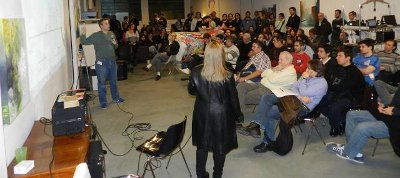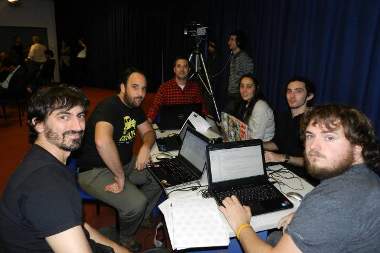Hacks/Hackers Buenos Aires tackles data retention and a hackathon
Este post también está en español

Hacks/Hackers Buenos Aires held a super “Demo Day” in Buenos Aires, followed by sending a team to a hackathon in Rosario, located 300 km from the capital of Argentina. The meeting also drew investors and entrepreneurs in the tech world.
Malte Spitz of Germany was the keynote to the second Hacks/Hackers Buenos Aires meetup, which drew more than 150 people at Areatres – Palermo Hollywood. The Volcanic ash that spread through Argentina also prevented him from coming, but Malte finally made it. Using the location-tracking data from the German phone company, Spitz worked with the German newspaper Zeit On Line to create an application that portrayed six months of his life, almost second by second. The application was a clear example of the implications of “data retention” and the risk that comes when companies keep such data.
His talk was followed by other companies demoing. Martín Sarsale demonstrated an automatic mapping of the testimony, pleadings and court decisions of the last military dictatorship. Several participants decided to join the proposal developed by this reporter with Sarsale. Their goal is to create a platform that can analyze documents, relate and find connections between testimonies that are difficult to find in an “analog” way.
Paula Carri from The Real Time Argentina showed a real-time analysis tool for social networking sites and news media, while Juan Damia from Social Metrix told how the company’s semantic tool works for measuring positive or negative impacts on social networks.
Francis Petty from GroovinAds explained how technology can be used to improve the online advertising sales to reorganize journalistic content.
The second # hhba was made possible through the support of the Mozilla Foundation, Area Tres, Globant, La Nación and Fundación Heinrich Böll Stiftung.

A week later, Hacks/Hackers Buenos Aires was invited to attend the 4th International Forum on Digital Journalism in Rosario, 200 miles from Buenos Aires city. The Forum was attended by about 200 editors and journalists who specialized in digital media in Latin America. Hacks/Hackers Buenos Aires sent a team of eight people (Guillermo Movia, Felipe Lerena, David Lima Cohen, Ezequiel Clerici, Anahí Lobato, Dardo Ceballos, Candelaria Vidal Valls and Mariano Blejman) who worked on creating an application in HTML5 to view and provide contextual information.

The tools used were CSS3, JavaScript, Popcorn.js, video converters such as Miro, Ffmpeg and Firefox’s tools. The result was an application that “edits” and plays the video presentation, offers background information, provides access to reference material and other aggregates, and also shows effects on Twitter. The code was released with a GPLv3 license. We must have impressed them well enough, because the Hacks/Hackers Buenos Aires team received invitations to participate in conferences in other cities in Argentina, and also Panama and Colombia.
Thanks to Mozilla Argentina, The Real Time and the 4° Foro Internacional de Periodismo Digital en Rosario for making the hackathon possible.
Hacks/Hackers Buenos Aires is organized by Mariano Blejman, Martín Sarsale, Mariana Berruezo, Guillermo Movia and César Miquel.



